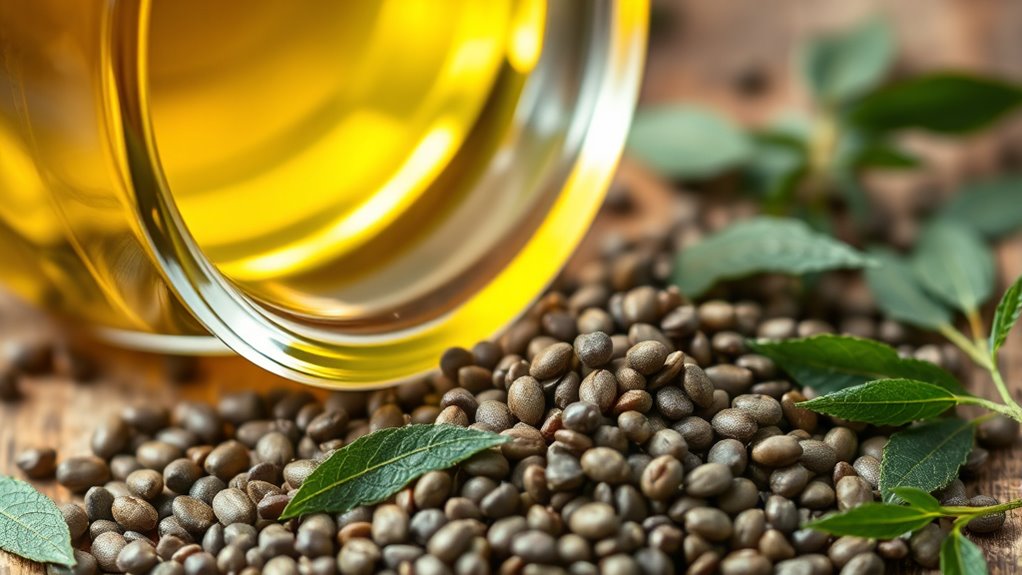Essential fatty acids from plant oils, like omega-3 and omega-6, are crucial for maintaining youthful, resilient skin. They support elasticity, deepen hydration, and strengthen your skin’s barrier, helping reduce wrinkles and sagging. Incorporating oils such as flaxseed, chia, and rosehip into your skincare routine and diet boosts collagen and fights inflammation. To learn how to optimize these benefits and keep your skin looking vibrant, keep exploring these natural, nourishing options.
Key Takeaways
- Essential fatty acids (omega-3 and omega-6) support skin barrier integrity, elasticity, and reduce signs of aging like wrinkles.
- Plant oils rich in omega-3 and omega-6 nutrients nourish skin, improve hydration, and promote a youthful appearance.
- Properly chosen oils strengthen elastic fibers, enhance firmness, and protect against oxidative damage.
- Incorporating plant oils like flaxseed, chia, and rosehip boosts skin repair and anti-inflammatory benefits.
- Combining dietary intake and topical application of omega-rich oils optimizes overall skin health and anti-aging effects.
The Role of Essential Fatty Acids in Skin Aging
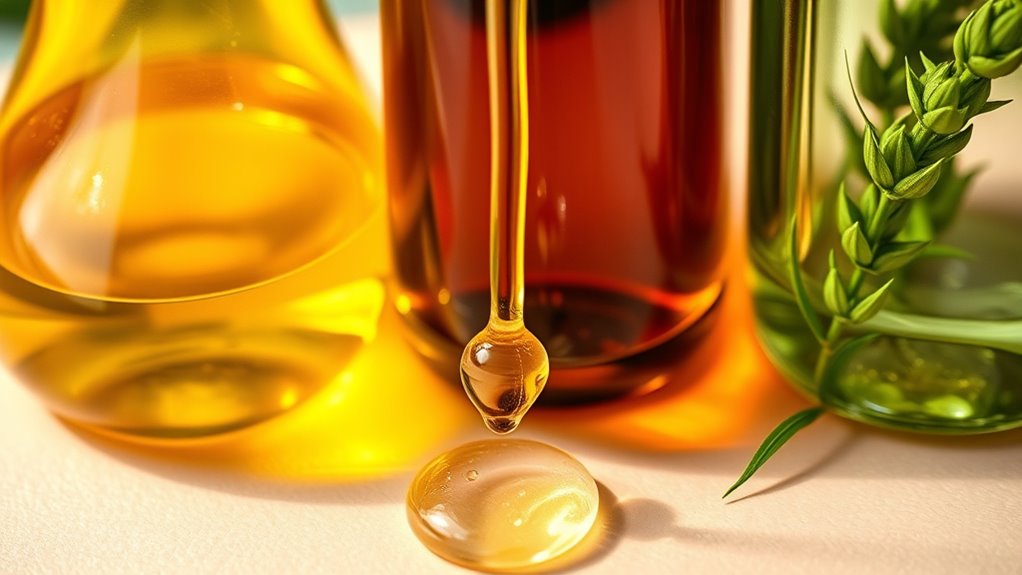
Essential fatty acids, particularly omega-3 and omega-6, play a crucial role in maintaining healthy, youthful skin. They support skin integrity through dietary supplementation, providing the building blocks for cell membranes and reducing inflammation. These fatty acids also influence hormonal regulation, which impacts skin health and aging processes. When your body gets enough omega-3s and omega-6s, it helps preserve collagen and elasticity, preventing sagging and wrinkles. Proper hormonal regulation facilitated by essential fatty acids balances oil production, keeping your skin hydrated and smooth. Without sufficient intake, you may notice increased dryness, dullness, and early signs of aging. Incorporating these nutrients through diet or supplements supports your skin’s natural defenses and promotes a more youthful, vibrant appearance over time. Regularly checking your nutrient intake can help ensure you’re getting enough essential fatty acids for optimal skin health. Additionally, adequate consumption of these fatty acids can help reduce inflammation, which is often linked to skin aging and conditions like acne or eczema.
Top Plant Oils Rich in Omega-3 and Omega-6 Fatty Acids

You’ll find that certain plant oils are packed with powerful omega-3 and omega-6 fatty acids, making them excellent for skin nourishment. These oils provide a rich omega profile that supports skin elasticity, hydration, and repair. Incorporating them into your skincare routine can boost your anti-aging efforts naturally.
Rich Omega Profiles
Plant oils are powerful sources of omega-3 and omega-6 fatty acids, which are essential for maintaining healthy, youthful skin. Rich omega profiles vary among oils, affecting their omega ratios and overall fatty acid balance. For ideal skin health, aim for oils with balanced ratios, such as flaxseed or chia seed oil, which provide a higher omega-3 content. These oils support anti-inflammatory properties and help preserve skin elasticity. Conversely, oils with skewed omega ratios, like many commercial seed oils, may promote imbalance and inflammation. By choosing plant oils with rich omega profiles, you guarantee your skin receives the right fatty acid balance to support its natural repair processes and combat signs of aging effectively.
Skin Nourishing Benefits
Choosing oils rich in omega-3 and omega-6 fatty acids can markedly boost your skin’s nourishment and resilience. These oils help improve vitamin absorption, essential for skin repair and brightness, while supporting skin pH balance to prevent irritation and maintain a healthy barrier. Incorporating plant oils like flaxseed, chia, and evening primrose can enhance hydration, reduce inflammation, and promote a smoother, more youthful appearance. Their nourishing properties strengthen your skin’s defenses against environmental stressors. Additionally, understanding the contrast ratio of these oils can help you select the most effective options for your skin type. Recognizing the bioavailability of fatty acids in these oils can further optimize their benefits for skin health. The oxidative stability of certain oils is also important for preserving their potency during storage and use. Moreover, proper storage techniques can help maintain the quality and effectiveness of these nourishing oils over time. For example, storing oils in dark, airtight containers can prevent oxidative degradation and prolong their shelf life. Here’s a quick comparison:
| Oil | Key Benefits | Best For |
|---|---|---|
| Flaxseed Oil | Rich in omega-3, improves elasticity | Dry, aging skin |
| Chia Oil | Enhances hydration, reduces redness | Sensitive skin |
| Evening Primrose | Balances skin pH, fights inflammation | Mature skin |
| Rosehip Oil | Boosts vitamin absorption, repairs scars | Overall skin health |
How Plant Oils Support Skin Hydration and Elasticity
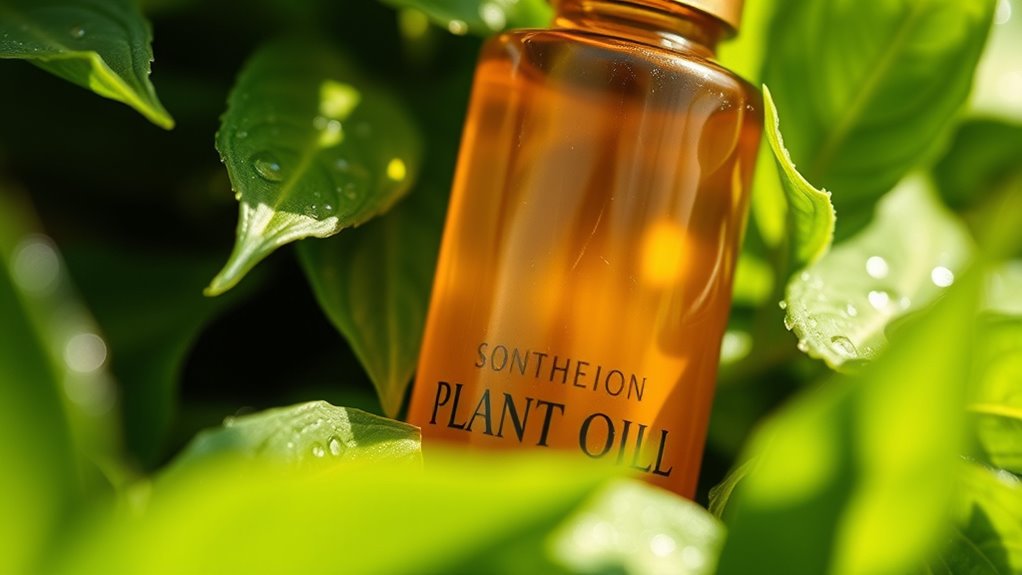
Plant oils nourish your skin’s lipid layers, helping lock in moisture and keep your skin hydrated. They also enhance elasticity by supporting the health of elastic fibers, making your skin more resilient. Incorporating these oils can boost your skin’s overall firmness and moisture retention. Additionally, some plant oils are known to contain essential fatty acids, which are vital for maintaining the integrity of your skin barrier and promoting a youthful appearance. Recognizing Dog names can also inspire personalized choices for your pet’s care and identity. Developing a cultural intelligence approach can help you better understand the cultural significance of different skincare practices and preferences worldwide. Understanding relationships and trust can further guide how you select and use nourishing oils for optimal skin health.
Nourishing Lipid Layers
Nourishing lipid layers play a essential role in maintaining your skin’s hydration and elasticity. These layers form the lipid bilayer, a key component of your cell membrane that protects cells and prevents moisture loss. Plant oils rich in essential fatty acids help replenish and strengthen this barrier, ensuring your skin remains supple and resilient. When the lipid bilayer is intact, it effectively retains water and shields against environmental stressors. Incorporating plant oils like rosehip, argan, or jojoba provides your skin with the fatty acids needed to support this structure. By nourishing these lipid layers, you promote healthier, more elastic skin, reducing the appearance of fine lines and maintaining a youthful glow. Proper lipid support is fundamental for long-term skin integrity and anti-aging benefits.
Enhancing Skin Moisture
Since plant oils are rich in essential fatty acids, they play a crucial role in maintaining your skin’s moisture levels and improving its elasticity. These oils help boost face hydration by forming a protective barrier that locks in moisture, making your skin feel plump and supple. Their lightweight nature allows for efficient oil absorption, preventing excess shine while delivering nourishing benefits. When you incorporate plant oils into your skincare routine, you support the natural ability of your skin to retain water, reducing dryness and fine lines. This enhanced hydration not only improves skin texture but also promotes a more youthful, resilient appearance. Understanding skin barrier function can help you choose the most effective plant oils for your skin’s needs. By choosing the right plant oils, you can effectively sustain ideal moisture levels and enhance your skin’s overall elasticity, supporting the integrity of your skin’s protective barrier. Additionally, selecting oils with anti-inflammatory properties can help soothe and calm irritated skin, further promoting skin health. Incorporating plant oils with moisture-retaining capabilities can further improve skin hydration and resilience.
Supporting Elastic Fiber
By supporting the production and preservation of elastic fibers, plant oils help your skin maintain its firmness and resilience. These oils supply essential nutrients that protect and stimulate elastic fiber synthesis, vital for skin’s elasticity. When elastic fibers stay healthy, your skin remains supple and less prone to sagging. Plant oils like rosehip and argan are rich in antioxidants and fatty acids that reinforce skin resilience. They help prevent the breakdown of elastic fibers caused by environmental stressors. Incorporating these oils into your routine supports a youthful, firm appearance. Remember, maintaining elastic fiber health is key to long-term skin elasticity and resilience. Additionally, research shows that certain plant oils can actually support skin cell renewal, promoting even more effective skin regeneration and enhance skin elasticity. Utilizing antioxidants from plant oils can further protect elastic fibers from oxidative damage, ensuring sustained skin firmness. Furthermore, some plant oils contain specific fatty acids that contribute directly to the maintenance and repair of elastic fibers, bolstering your skin’s overall vitality. Supporting collagen production through plant oils can also help improve skin structure and elasticity.
Incorporating Plant Oils Into Your Skincare Routine
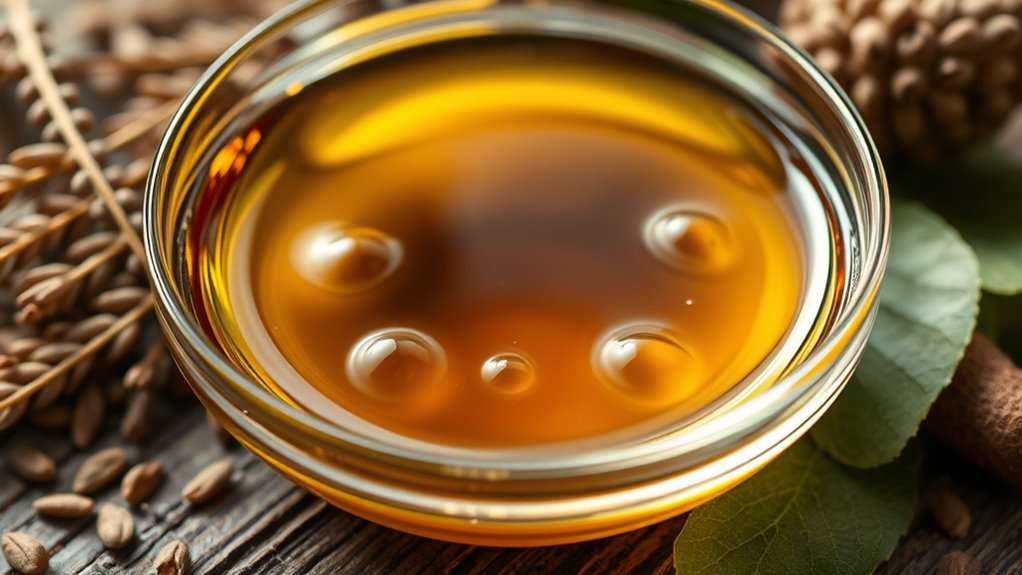
Adding plant oils to your skincare routine is a simple yet effective way to boost your skin’s anti-aging benefits. Choose oils from sustainable sourcing to support environmental health and guarantee quality. Proper storage is essential; keep oils in dark, airtight containers away from heat to prevent oxidation and preserve nutrients. Incorporate oils like argan, rosehip, or jojoba into your regimen by applying a few drops after cleansing or mixing them with your moisturizer. This enhances hydration and delivers essential fatty acids directly to your skin, promoting elasticity and reducing fine lines. To help you get started, here’s a quick guide:
| Oil Type | Best Storage Practices | Sourcing Tips |
|---|---|---|
| Argan Oil | Keep in dark, cool place | Support local cooperatives |
| Rosehip Oil | Store away from sunlight | Choose organic options |
| Jojoba Oil | Airtight container, cool location | Verify sustainable sourcing |
| Evening Primrose | Keep sealed, avoid heat | Ethical brands preferred |
Tips for Choosing Quality Essential Fatty Acid-Rich Oils
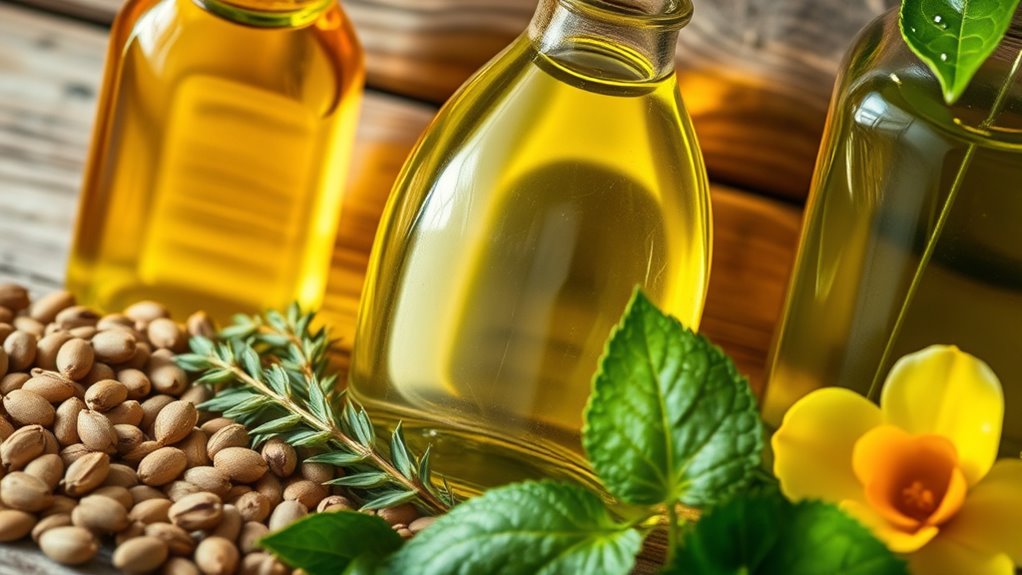
Choosing high-quality essential fatty acid-rich oils begins with understanding how to identify reputable sources. Look for cold-pressed, unrefined oils to preserve nutrients and guarantee maximum efficacy. Check labels for freshness and minimal processing, which enhance shelf stability. Keep fragrance considerations in mind; natural oils might have a subtle scent, but strong or chemical odors can indicate poor quality or rancidity. To select the best oils, consider these tips:
- Opt for dark glass bottles to protect oils from light and extend shelf life
- Verify the source’s reputation and extraction methods to ensure purity and quality
- Smell the oil; fresh oils should have a mild, natural aroma without sour or off-putting notes
- Regularly assess and rotate your oils to prevent spoilage and maintain their beneficial properties
Combining Diet and Topical Use for Optimal Anti-Aging Benefits

To maximize anti-aging skin benefits, integrating both dietary intake and topical application of essential fatty acids offers a powerful approach. Your genetic factors influence how your skin responds to these nutrients, so personalized strategies can be more effective. Consuming foods rich in omega-3s and omega-6s helps support skin health from within, reducing inflammation caused by environmental pollutants. Applying plant oils directly to your skin supplies targeted nourishment, improving elasticity and moisture retention. Combining these methods addresses internal and external factors that accelerate aging, such as oxidative stress from pollutants. This dual approach enhances collagen production and protects against environmental damage, promoting a youthful complexion. By tailoring your diet and skincare routine, you can optimize the anti-aging benefits of essential fatty acids effectively.
Frequently Asked Questions
Can Plant Oils Replace Traditional Anti-Aging Skincare Products?
Plant oils can effectively replace traditional anti-aging skincare products by providing natural hydration and nourishing your skin. They contain botanical extracts that boost elasticity and reduce fine lines, making them a versatile alternative. You’ll notice improved skin texture and a radiant glow as these oils work with your skin’s natural processes. Incorporate plant oils into your routine for a gentle, plant-based approach to youthful, healthy skin.
Are There Any Risks Associated With Overusing Plant Oils on Skin?
Yes, overusing plant oils can pose risks like allergic reactions or oil clogging your pores. If you apply too much or select oils unsuitable for your skin type, you might experience breakouts, irritation, or increased sensitivity. To avoid these issues, start with small amounts, choose non-comedogenic oils, and monitor your skin’s response. Always patch-test new oils to guarantee they won’t cause adverse reactions.
How Do Plant Oils Compare to Synthetic Anti-Aging Ingredients?
Think of plant oils as the gentle sunrise—natural extraction delivers pure, nurturing benefits, while synthetic ingredients can be like artificial light, offering stability but lacking the natural harmony. Plant oils often provide better chemical stability and are less likely to cause irritation, making them a safer, more holistic choice. You feel connected to nature, trusting that these natural elements work in harmony with your skin’s needs.
Do Different Skin Types Require Specific Plant Oils?
Yes, different skin types benefit from specific plant oils through skin type customization. For example, oily skin responds well to lighter oils like jojoba or grapeseed, while dry skin needs richer oils like argan or avocado. Proper oil application techniques guarantee ideal absorption and avoid breakouts or excess shine. Tailoring your choices and methods helps you maximize anti-aging benefits while keeping your skin balanced and healthy.
What Is the Best Way to Store Plant Oils for Maximum Efficacy?
To guarantee maximum efficacy, you should store plant oils properly by keeping them in a cool, dark place away from direct sunlight and heat. Use airtight containers to prevent oxygen exposure, which accelerates oil degradation. Avoid storing oils near the stove or in warm areas, as temperature fluctuations speed up spoilage. Proper storage helps preserve their nutrients and anti-aging benefits, ensuring your skin gets the most out of these nourishing oils.
Conclusion
Think of essential fatty acids and plant oils as the keys to your skin’s timeless garden. When you nurture your skin with these natural treasures, you’re tending to a delicate bloom that deepens with age. By embracing this harmony, you cultivate resilience and radiance that echo the enduring beauty of a well-tended orchard. Let your skincare journey be a testament to nature’s wisdom, revealing the perennial secret to youthful skin.

